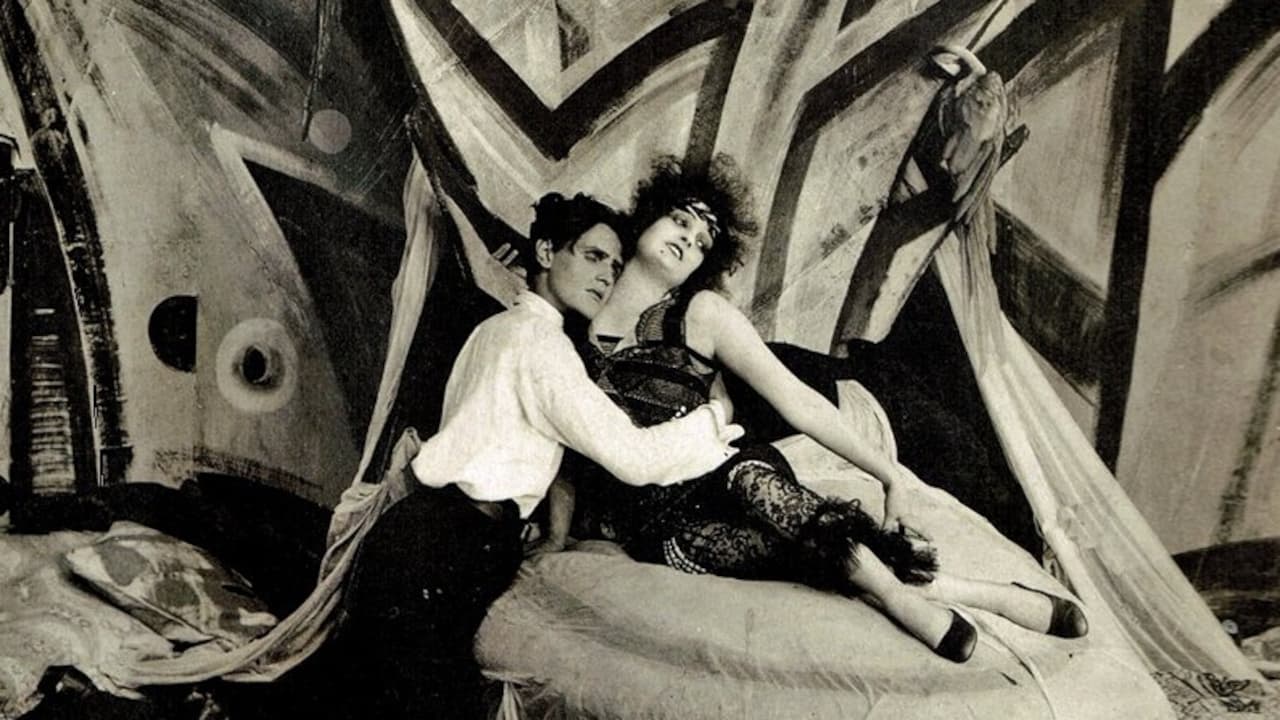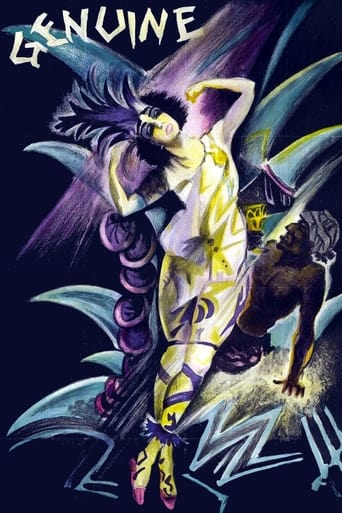Pluskylang
Great Film overall
Plustown
A lot of perfectly good film show their cards early, establish a unique premise and let the audience explore a topic at a leisurely pace, without much in terms of surprise. this film is not one of those films.
Lidia Draper
Great example of an old-fashioned, pure-at-heart escapist event movie that doesn't pretend to be anything that it's not and has boat loads of fun being its own ludicrous self.
Horst in Translation (filmreviews@web.de)
"Genuine" or, in the longer version, "Genuine: A Tale of a Vampire" is a German movie from 1920, so it soon has its 100th anniversary. It is still silent and, even more obvious, in black-and-white. Director Robert Wiene and writer Carl Mayer have worked (together) on a couple more fairly famous silent film classic, especially "Das Cabinet des Dr. Caligari", which also came out in 1920. Their effort with "Genuine", however, seems quite forgettable to me. The vampire did look scary I must admit and we have to give them thumbs-up because this was actually done before Nosferatu, bit still the action, story and acting were just not too interesting. There are 2 versions out there, a long one that runs for almost 90 minutes and a 44-minute version, the one I watched. Actually, I only found the short version. But I am perfectly fine with it as, like I wrote before, this was a mediocre film at best and **/***** is almost still a generous rating. No need to watch another 45 minutes of it. I do not recommend "Genuine", a genuinely uninteresting film,
Dalbert Pringle
Regardless of this silent-era picture now being almost 100 years old, it's still not worth more than a 2-star rating, in my books.Believe me, this German export was pretty bloody awful (even when I took into account it being a product of cinema's by-gone days).For one thing - Had the leading actress, Fern Andra (who played the title character, Genuine) been even marginally attractive, then, yes, that would've certainly helped this nonsensical film at least rise above its sub-par mediocrity.But this actress (with her frizzy hair and bug eyes) had to be one of the absolute, most dog-ugly dames imaginable, regardless of the era of fashion that she represented.It's especially when you take into consideration that the Genuine character was supposed to be an irresistible seductress (aka. vamp-ire), where all the men were literally falling head-over-heels in love with her (and actually quite willing to commit murder, if she so commanded) that her decidedly cheap and somewhat creepy looks rendered her (along with the rest of the movie) as being repulsive rather than attractive.Besides not being even slightly entertaining (even from a nostalgic point of view), I found this moldie-oldie, with its ridiculously exaggerated acting, to be nothing but a stale, old joke told in very bad taste.Thank goodness this film only had a running time of just 43 minutes.
cstotlar-1
I caught this years back at the Paris Cinematheque hoping to find something of interest from the director of Caligari. It was a disappointment in just about every way for me. First, the film at its original length seemed to go on forever. The elements were there, granted, but they didn't combine as they did in the previous film. I had the feeling of watching a film that was going through all the necessary steps but missing all the points. It was more an exercise in style which blindly followed all the guidelines but missed going anywhere. On the other hand, and perhaps unfairly to subsequent films, "Caligari" was a one-of-a-kinder that left no space for a sequel. Period.Curtis Stotlar
MARIO GAUCI
I’ve been wanting to give this a whirl ever since acquiring it six years ago – as part of the Kino edition of the same director’s THE CABINET OF DR. CALIGARI (1920). However, the result (without taking into account its obvious narrative gaps, being incomplete in this version) is nowhere near as groundbreaking or even compelling as that earlier classic – despite the comparable Expressionist look (including a clock standing in for the face of a skeleton[!] and which is still its best quality).The plot revolves around a femme fatale called Genuine – hence, the vampire of the title is not of the blood-sucking variety – who had actually been the high priestess of some cult. Due to a clash between factions, she ends up in a slave market (featuring surprising but discreet nudity) and is eventually bought by an eccentric old man (among other things, he likes to doze off while being shaved daily!), who keeps the girl in the cellar of his ‘notorious’ mansion so as to shelter her from the vices of modern life; incidentally, one is never quite sure in which era this is all supposed to be taking place – since the dapper but doddering old man has an Arab, with painted bare chest, for a servant! The irony, then, is that the girl’s own nature – she has a feral countenance and wears a skimpy striped outfit! – is infinitely more dangerous to the young men she enslaves (one of whom sports a highly anachronistic Duran Duran hairdo!). These, in fact, are somehow driven mad (as it stands, the details aren’t very clear – particularly with respect to the old man’s nephew); when the son of his exclusive barber is similarly afflicted, the latter rouses the populace against her and – in a scene which basically replicates Cesare the somnambulist’s fate from the aforementioned THE CABINET OF DR. CALIGARI – she dies in the ensuing pursuit.In conclusion, the treatment afforded the film isn’t sufficiently gripping to rate it higher than a mere curio at this juncture; besides, it’s all the more disappointing coming from Wiene (who, besides CALIGARI also made the equally influential THE HANDS OF ORLAC [1924]). By the way, another interesting effort of his – the Dostoyevsky adaptation RASKOLNIKOV (1923) – will soon be released on DVD by the budget label Alpha (under the alternate title of CRIME AND PUNISHMENT)…

